|
George W. McCoy Collection
|
M1978.01.02 |
WHO
LEAVES NORTH CAROLINA, WHO COMES IN, AND WHY...
An interview with Rupert Bayless Vance, June 3, 1960 |
|
Box |
File |
Item # |
Date |
Description |
Thumbnail |
| 2 |
2 |
gmc_079 |
|
NEWS BUREAU UNIVERSITY OF NORTH
CAROLINA P. 0. BOX 930 June 3, 1960
Release at Will
(Special to Editors of Editorial Pages,
Feature Editors, Others)
WHO LEAVES NORTH CAROLINA, WHO COMES IN, AND
WHY... OUT-MIGRATION AMD IN-MIGRATION, INDUSTRIALIZATION,
UNEMPLOYMENT
An
Interview * With Rupert Bayless Vance
Kenan Professor of Sociology, University of North Carolina (An
authority on population and human geography, Dr. Vance has been a
member of the facility at the University of North Carolina since
1926. His specialties are ecology, social theory, population, and
social structure. He has been President of the American Sociological
Society. He is a native of Arkansas, received his M.A. degree at
Vanderbilt University, his Ph.D. at Chapel Hill. He is author of
"Human Geography of the South" and "All These People: The Nation's
Human Resources in the South", the latter acclaimed by population
experts as a model of its kind.)
* Interview conducted by Pete Ivey, Director
of News Bureau University of North Carolina
Question: Dr. Vance, are you alarmed over
Census reports and some of the comment about North Carolina's loss
in population — that is, that the out-migration has been more than
the in-migration in the past ten years?
A: No. I am not alarmed. To the contrary,
when I examine the long-term drift of populations, "bur mobile
economy, our right of free choice of movement from state to state,
the problems of modern industrialization and North Carolina's hopes
and potentials for the future, I find more cause for rejoicing than
for grief. Had it not been for North Carolina' s. high birthrate, we
might have had a net loss in population.
Q: What kind of people left and what kind
came in.
A: We won't know the details until additional
Census data becomes available later on — such as specific
information about age, sex, race, rural and urban residents and the
like. Q: From your present observation, can you tell who left and
who came in, and why it happened? A: You might say that we swapped
manual labor for brain labor. |
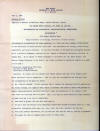 |
| gmc_080 |
|
Q: What do you mean by that?
A: The people who left the state chiefly were
farm laborers who became unemployed because it takes fewer farmers
today to produce more. Others who left were manual laborers in the
towns and cities. The ones who came in were people with technical
skills and executive capacity. We send out about eight manual
workers and get back about one brain worker — that's about the
ratio. Q: What attracted the in-migration?
A: New industries in North Carolina.
Manufacturing. At the same time there was expansion in service and
distributing industries.
Q: Why didn't the new industrial development
result in new jobs for people leaving the farms?
A: It did. Thousands of North Carolinians got
jobs in the new industry. But not enough new industry came in to
hire all of the people who became unemployed. So they looked for
jobs where they could find them. They went out of the state.
Q: Is the loss in population — more going out
than coming in — a normal happening, something that might have been
expected, or is it astonishing?
A: In the kind of society and form of
government we have, people can move over state boundaries at will.
We don't want to keep them at home if they don't want to stay at
home. We don't have a right to do that. At the same time, we don't
want to be in a position of pushing people out of the state.
Q: Were the North Carolina population
statistics of 1960 surprising to you?
A: No. The out-migration in North Carolina
has exceeded the in-migration in every Census since
1880.
Q: What caused it the last eighty years? Has
the trend been gradual and regular?
A: It has had its ups and downs but the long
term trend has been for the out-migration to exceed the
in-migration. From 1920 to 1930, North Carolina's loss of people was
heavy) the main reason was that agriculture was depressed in North
Carolina and the rest of the country was doing well industrially.
The result was that the unemployed on our farms went outside the
state to get jobs. In the 1930's we has a national and worldwide
depression; and between 1930 and 1940 industrial jobs were scarce
all over the country. During that period many came back to North
Carolina.
Q: Does it follow then that a good way to
keep people from leaving North Carolina is to have a national
depression? And would it be true that in times of prosperity
generally over |
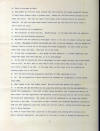 |
| gmc_081 |
|
the country, we can expect people to leave North
Carolina in greater numbers than people come in?
A: That is one conclusion, but there are other
factors entering into migration and population. In the World War II
period 1940 to 1950, for example, people moved around. Going into
service tends to move people. Once begun, the movement has
continued.
Q: Has this same trend been a factor from
1950 to 1960, with the draft still in force and the cold war going
on?
A: Yes, it has. And I don't think it's
altogether bad. It's all right for people to move around. They get
to know the world more. That is especially true for people living in
the mountains. They never would have gotten out of the hills if they
hadn't gone into service. I am not against crossing state
boundaries. We don't have customs barriers or frontiers in this
country. The only time I was ever stopped at a state boundary was to
check my car for Japanese beetles.
Q: So, you are not opposed to North
Carolinians leaving home?
A: If they can't get good Jobs at home, they
had better go elsewhere. It's better than hanging around unemployed
— especially if there are good jobs they can do in other states.
Q: But aren't we losing valuable talent when
they go out of the state, potential manpower than we cannot afford
to lose?
A: It is true that when you raise and educate
a man all the way through the university, you make' an investment of
thousands of dollars — say $20,000 a person, or the cost of a good
house. It would be nice if you could keep all of them at home. But,
if there is no need in North Carolina for his services for the time
being, it is much better for the individual to go where he can be
useful. It's sort of like the game of fruit basket, and fitting
round pegs into round holes. There are jobs in other states. So they
go there.
Q: Don't we have jobs in North Carolina that
many could fill, too. Don't we get people from other states to come
into this state for jobs?
A: Yes, we have good jobs that attract people
from other states. The whole thing is a swap-around arrangement, and
it isn't too bad. The main thing is to watch out and not be on the
losing end of the deal. Naturally we are disappointed in North
Carolina that we didn't grow more.
Q: What kind of people have we lost and what
kind have we gained?
A: We have lost farm laborers and manual
laborers mainly, and we have gained professional |
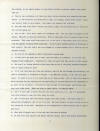 |
| gmc_082 |
|
people and technicians. That is
why I say we have swapped manual labor for train labor.
Q: What are the economic forces which have
caused out-migration and in-migration?
A: There have been pushes and there have been
pulls. The thing that has worked to push people out of North
Carolina has been the shrinking importance of agriculture. It is not
that we are growing less on the farms. Crops are as abundant Or
better than ever. Farms today are larger, but regardless of size,
each can grow more than it used to. We don't need as many farmers.
All of the knowledge of scientific farming, all of the help given to
the farmer by agricultural colleges and the extension services, the
mechanization, the improved breeding practices, better seed, better
fertilization — all have served to produce bigger yields. Ten
farmers in 1960 can grow what it took twenty or thirty farmers to
grow thirty years ago. We are having to sit on the lid and do
everything we can to keep down acreage. If North Carolina farmers
were to turn loose and grow all of the tobacco that could be grown
in this state, we would have so much tobacco the world wouldn't be
able to take it all. But all of it has tended to create unemployment
on farms and push people off the farms — some of them out of the
state.
Q: What about the pulling forces?
A: The pull, or bringing new people into
North Carolina, means the continued expansion of services — white
collar work. You can't mechanize service jobs like you can mechanize
farming. The doctor has to take some time with each individual
patient. Teachers find that learning can best be absorbed in small
classes. There is no ceiling over white collar work as there is in
agricultural production.
Q: Dr. Vance, is North Carolina's loss
unique? Have many other states lost people in that manner?
A: Other southern states have lost, some of
them more than North Carolina. The same factors have been at work.
And the trend is not confined to the South. For instance, New York
City has lost people. A recount was demanded, and when they got the
recount, they hesitated to make it public. City populations are
moving to the suburbs. Chicago's inside city limits owes practically
all of its recent growth to the in-migration of Negroes from the
South. The nation's major growth is taking place in the West. The
West Coast is the fastest growing region, especially California.
Q: What could have been done to hold on to
those people that we lost by out-migration?
A: We could have industrialized at a faster
rate, and brought in more service, distribution |
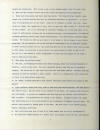 |
| gmc_083 |
|
and manufacturing plants — that
is, if we could have done so. That would have channeled some of the
unemployed farmers and manual laborers into the growing industrial
life. What has happened is that we haven't industrialized fast
enough to take up the slack in farm unemployment. That accounts for
the lag.
Q: Why didn't we industrialize faster?
A: We must be as frank about our limitations
in North Carolina as well as about out strong points. In the first
place, we don't have in this state two fundamental things that make
for a great industrial region. First, we lack the basic metals. We
don't have coal. We lack iron ore and bauxite for aluminum. Second,
we don't have petroleum, the basis of an oil economy. We don't have
a Birmingham, and we don't have what Texas and Louisiana have.
Q: If we could have industrialized more
carefully and in an accelerated-manner, could we have retrained our
farm and manual laborers for the new jobs in growing industry?
A: Somewhat. We have missed the boat on some
things. We can grow soybeans in this state in large quantities. But
we don't process them. Others make the soy sauce. Maybe we could
have done better had we processed more farm products and trained the
farm people who are right next to it — and kept them in North
Carolina. We have done that to a certain extent, and the processing
industries are growing — in peanuts, pickles, sea food, and the
like.
Q: Has North Carolina been worse off than
other southern states in its holding power on those who feel
impelled to go to other states?
A: We have done better than some of them.
Arkansas has suffered, and so has Mississippi and Alabama. Some
southern states have actually had population losses, regardless of
high birthrates .
Q: How do the other southern states see that
development?
A: Although we may be feeling sorry for
ourselves, some of the other southern states are looking to North
Carolina as an example of success — in industrialization.
Q: Didn't South Carolina for a while have
success in winning new industry — much more so than some of her
neighboring Southern states.
A: Yes, South Carolina had a boom for a
while. It was largely because of the Savannah River development. But
at the present time the situation is becoming stabilized in South
Carolina.
Q: What other things could we do to promote
more and better industrialization in North Carolina in spite of the
handicaps of not having basic metal and oil resources?
A: We might consider New England's example.
That is not a metals producing area. Yet Yale |
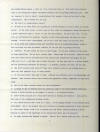 |
| gmc_084 |
|
locks are made there. There is
manufacturing calling for high skills. New England is a center for
electronics. Some of these things North Carolina might he able to do
— just as we were able to attract much of the textile industry. We
have emerged as a furniture manufacturing state, becoming another
Grand Rapids, Michigan, and we have done this in spite of the fact
that we have now approached the point that we must import much of
the wood and other materials that go into furniture.
Q: Then we should try for new skills and new
industries?
A: Yes, but we must be very careful about
this. You don't build up a tradition of excellence overnight. As a
caution, I might say that I have often felt it would be a great
mistake for the South to go into the automobile manufacturing
business. Assembly plants, yes. But for South to attempt automobile
manufacturing would be economic suicide. We should not deceive
ourselves that just because we want something badly we are going to
get it. We would lose our shirts in the process.
Q: Haven't we lost some young people, college
graduates going into business, and university trained school
teachers? What about them?
A: Yes, we have. Graduation from college is
the major time for moving. Young people will be getting married,
looking for the very best job opportunities and many of them go out
of the state — striving-for better jobs, maximum opportunity. Yet,
we attract some able college graduates into the state, skilled
people. Some of them come to colleges here and remain, while ours go
to other states. I think that is natural and not bad.
Q: What has been the effect of unemployment
on city workers in comparison with farm workers in North Carolina?
A: The city workers don't have the staying
power of the man on the farms. Unemployed city workers are forced to
move earlier. They have to pay rent in the cities, or go on relief,
or move.
Q: Have the efforts to bring in new industry
in any way injured the agricultural economy?
A: I don't see how. New industry buys what
the farms produce. New industry employs thosewho move off the farms.
Agriculture benefits greatly by a balance of farming and industry.
When cities grow, more demand is created for products of the farm.
Q: Then you feel industrialization has not
worsened the lot of the farmer?
A: No. The farmers would have been much worse
off than they are now if we hadn't been gradually industrializing.
Take Mississippi as an example. Mississippi hasn't industrialized, |
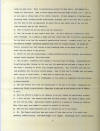 |
| gmc_085 |
|
hasn't kept up with other
states. And their agricultural economy has suffered because of it,
much more than we have. Q: Many of the
out-migrants are Negroes, and some people have declared that the
majority of the Negroes leaving the South are the most able ones,
the college graduates and those who have acquired skills. They also
say that while the able Negroes go North, their less able cousins
remain at home to be cared for. What is your opinion of that?
A: I doubt that it is so. Frankly, I think we
do a better job in employing Negro teachers in the South, for
instance, than they do in the Northern states. The main jobs for
Negroes in the North are in manual labor. Not many get white collar
jobs in the large northern cities. They usually follow manual labor,
factory jobs. But in the South, the educated Negroes are able to
practice trades and professions — law, medicine, business — because
of the large Negro population. After the Negro crosses the
Mason-Dixon Line going northward the main jobs available to Negro
women, after domestic service, are clerical and secretarial jobs,
chiefly in government.
Q: Has there been a known policy of getting
rid of low income people in the South, such as
the Negroes, and encouraging them to go to
other states?
A: No. I see no reason to accuse our people
of any such cruelty.
Q: Is there historical precedent, in other
regions and in other nations, for movement of people across
boundaries when industrialization comes, or agricultural techniques
promote more abundant yields in food?
A: Yes. We have seen this swap around for a
long time. When New England became industrialized originally and at
the same time farms became more efficient mechanically, some of the
men went into the new industry, but much of the new labor was
immigrant. The Portuguese, the Irish and the French-Canadians came
into New England mills. Many of the New England men went West and
became school teachers and professional men. New England has
exported educators for a long time. This was tragic in a way because
of what happened to women in New England. They didn't go west with
the men. They remained behind in New England and became spinsters.
At first, many New England women worked in industry. It was a
respectable thing to do. Lucy Larcom, the poet, was a textile
worker. But after the immigrants came, not many of the original New
England women worked in the mills. And they didn't marry the
immigrants. Something similar happened in England during the
industrial revolution. The countryside fed the English cities, and
many of the surplus English farmers came to America. |
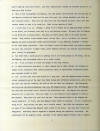 |
| gmc_086 |
|
It was the same in Germany.
There were some intellectuals, but most of the German immigrants to
this country were from peasant stock.
Q: Is this to he considered a national problem?
A: It will always be a national problem. It
was a problem during the depression. People left their homes, went
to New York and other metropolitan areas and went on relief if they
could. California had a policy of paying newcomers their way back
home. It was cheaper than relief payments. In New York at the
present time there is the problem of absorbing Negroes from the
South as well as Puerto Ricans. New York is not prepared to take
care of all the streams of people that go there. Another great
dilemma is the problem of migrant farm labor, those who go from
region to region to harvest crops and fail to stay in one place long
enough to establish legal residence.
Q: Isn't technological unemployment a main
feature of our modern economy, and isn't the problem of migration
and its effect on the economy going to get worse rather than better?
A: I think we are more fortunate than we have
any right to expect. Ever since World War II, people have been
predicting a depression. But somehow we keep right on producing.
Q: What other things can we do in North
Carolina to cope with the out-migration problem?
A: Besides industrialization and training, we
can make the best possible use of public employment agencies. These
agencies can be used a great deal more by employers and by
employees. Jobs to fit qualifications can be found — if not in the
same community or in the same state, then in another state. Another
thing we can do is improvement the quality of education — not only
in the colleges and universities but in the high schools. I speak
especially of technical high schools or any vocational center where
skills can be learned, where broader opportunities for versatile
occupations can be offered to young men and young women.
Q: Will the same out-migration trend continue
in North Carolina, with the out-migration again exceeding the
in-migration in 1970.
A: I am not the seventh son of a seventh son.
However, I would say that, barring a depression, the same trend we
have noticed since 1880 will continue during the next ten years. A
depression would reverse both the out-migration and the
in-migration. Obviously it is not worth it. Continued prosperous
times would tend to cause the same economic forces now operating to
continue. |
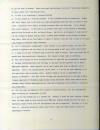 |
| gmc_087 |
|
Q: But suppose we industrialized, at a more
accelerated pace, wouldn't we reach a point of balance so that the
out-migration would diminish and the in-migration increase?
A: That day may come eventually, but it is
not now in sight. As I have said, we lack basic metals and oil
resources. We have to exert special efforts to build ourselves as an
industrial state by skillful means. We have done well with our older
industries — tobacco, textiles, and later furniture. And now we are
doing well in chemicals, paper, synthetics, electronics, woollens.
But there is another thing that concerns me.
Q: What is that?
A: We have been talking as though nothing
mattered except North Carolina. If we take industry from another
region, that region suffers and must adapt itself to the change. If
we took most the industry out of New York, for example, then we'd
have to pay the taxes here that New York is paying at the present
time, and the New Yorkers would be on the dole. Then we'd feel about
New York the way New York feels about us now. Another thing we must
consider: industry may eventually pass us by and go further South or
West.
Q: What can be done to give basic protection
to our economy no matter what happens?
A: We should do everything we can to get out
of the one-crop industry. We must diversify.
Q: Is out-migration to be avoided?
A: I don't think it's too bad to migrate. I
happen to be an in-migrant in North Carolina and am glad of it. Some
people go to New York and other places and have a darn good time and
live useful and happy lives. We do have people who refuse better
jobs at better pay in order to stay in North Carolina. In the main I
do not approve of that. Carried out as a policy it would lead the
state to expect to get something they can't pay for in full. This is
unrealistic and tends to spoil the people. What's bad is for a
person to prepare himself for the future, to look around and not be
able to find a job to fit his skills. That situation can be helped
by migrating, or bringing in new industry, or re-training in other
allied skills, and using existing employment agencies to match jobs
and men in appropriate harmony.
Q: Then you would say that we can consider
ourselves lucky to have done as well as we have?
A: I would acknowledge that the ideal
situation would be a perfect balance between agriculture and
manufacturing and growth.of allied service and distributing — for
one economic force tends to complement the other for the greater
well being of both and rising per capita wealth. But the plain
economic facts of life don't point to any perfect balance any time |
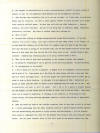 |
| gmc_088 |
|
soon. The best we can hope for
is gradual and consistent growth in certain industries, and these
must he sought and selected with care. I would say what seems
perfectly obvious: the two trends of out-migration and
industrialization do the most to help the state, under these
circumstances. But working in reverse (no out-migration and no
industrialization) can do a great deal of harm to the state. |
 |